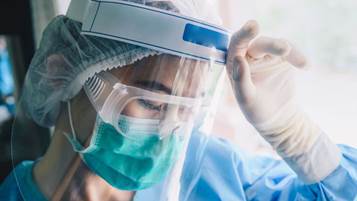A combination of heightened mobility across various provinces, an increase in super-spreader events, a new virus variant and a decrease in compliance with social-distancing protocols have contributed to the significant resurgence in positive coronavirus cases.
An analysis of reputable online Covid-19 reports shows that the official average number of daily cases per 100 000 people in the country increased to 34.4 per 100 000 during the week ending 10 January 2020 – significantly higher than the peak during the first wave of 21.2 per 100 000 less than six months ago. New daily cases and hospitalisations in January were almost three times higher than they were in early December. Whereas rolling seven-day, average daily confirmed deaths due to COVID-19 peaked at about 300 during the first wave, the second wave is peaking above 550.
Both private and state facilities are scrambling to recruit additional staff, with some reaching out to the military to assist, whereas others are calling on volunteers and retired medical staff to lend their support. An already strained workforce is again being overwhelmed by the surge in acutely ill patients and reduced capacity, as healthcare workers themselves become infected with the coronavirus or avoid the frontline as a result of co-morbidities identified as risk factors for more severe disease. Protocols aimed at preventing the transmission of the coronavirus within hospitals are slowing down work processes.
The frontline
“Working on the frontline is tough”, says Dr Bettina Taylor, head of EthiQal’s clinical risk management, “and those persevering day in and day out without a break must be lauded. Other than the strain of long hours and large patient loads, the constant need to maintain full personal protection is tiresome and wearing PPE all day is uncomfortable, to say the least,” she highlights. Mental fatigue is a major risk as well.
High weekly mortality rates, along with the fear of bringing coronavirus home from the hospital and infecting loved ones, can fuel anxiety and despair. Candles lining the entrances of hospitals – which have been lit to pay homage to the fallen heroes who lost their lives in the line of duty – is a stark reminder of everyone’s own vulnerability in terms of COVID-related disease. Medical practitioners having to operate outside of their usual scope of work, can furthermore be unsettling and many have had to accommodate a new way of work, including telehealth, for example.
“We have had many doctors ask for advice in terms of emerging medico-legal challenges and risks during the pandemic,” Dr Taylor highlights. “Notifications for purposes of insurance cover should a future need arise, range from COVID-related maternal deaths to patients having unrealistic expectations of a healthcare system in dire straits, and being frustrated by COVID-related protocols and their implementation. A Policyholder reported that one patient complained to The Health Professions Council of South Africa (HPCSA) after a surgeon had operated on his wife in the early stages of the first lockdown, without waiting for COVID test results, which were delayed because of processing backlogs. This despite the patient having earlier pushing for the surgery to go ahead, the doctor ensuring that patient and hospital transmission risks were mitigated, and all parties, including patient, hospital management and anaesthetist, agreeing for the surgery to go ahead.
As for the broader population, some lockdown measures have also not been kind to exhausted healthcare workers. Preventing access to open spaces such as beaches, parks and dams has taken away locations where tired bodies and minds can readily re-calibrate. The prohibition of access to these open spaces is not only frustrating, but also limits the opportunities for safe, outdoor exercise with all its physical and mental health benefits. Using law enforcement authorities to keep swimmers and surfers out of the water (except those who have accessed the ocean via man-made structures like jetties as opposed to sandy beaches), rather than controlling gang-related shootings and illicit alcohol abuse in overcrowded areas, adds no value in terms of viral transmission and protection of the healthcare system by dampening the overall disease burden.
Prioritising the needs of healthcare workers
“More than ever, the physical and mental well-being of South Africa’s healthcare workers must be a priority for policy-makers,” says Alex Brownlee, business head of EthiQal, pointing out the critical shortage of healthcare personnel before the onset of the pandemic. “It is encouraging that when the President recently announced the procurement of vaccines, he indicated that these will be made available to frontline healthcare workers first. But the logistics of the vaccine rollout remain unclear and are not as straightforward to implement as government authorities may have thought. As at January, no COVID-19 vaccine has yet been registered by the South African Health Products Regulatory Authority.”
Brownlee indicates that practitioners are valuing the medico-legal support provided by the organisation which he leads. One-on-one advice by a medico-legal advisor is focused on addressing challenges relevant to a practitioner’s specific circumstances, ranging from questions on how to ensure HPCSA compliance with regards to telehealth to dealing with moral dilemmas, for example where ICUs are full, and patients require beds.
Conclusion
South Africa’s frontline workers are no doubt a critical resource in minimising disability and death during the pandemic, and therefore their physical and mental well-being is key. The commitment of many doctors and nurses, young and old, is inspirational and must be preserved. Every effort – no matter how small – must be made to make their lives easier, whether it is by volunteering a few hours in the hospitals or preparing a meal for an exhausted frontline worker who has just finished another gruelling 12-hour shift. Resources from all social partners – government, business, labour and civil society – must be harnessed to expedite access to an effective and safe vaccine, ensuring that our healthcare workers on the frontline are first in line to receive this, for their benefit and ours.

